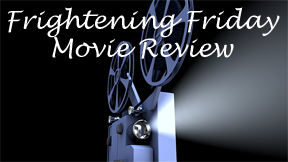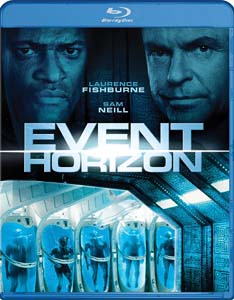Upon its release, “Event Horizon” (1997) was billed as “The scariest movie you will ever see,” and through the eyes of someone just getting into horror movies, it rang true. (Man, movies didn’t hold back with their hyperbolic boasts in the late ’90s, did they? See also: “1998: The year of ‘Godzilla.’ ”) A cult classic now, director Paul W.S. Anderson’s film more often goes by the comparatively reserved “Infinite Space, Infinite Terror,” and I have to admit that “Event Horizon” doesn’t chill me to the bone like it used to.
Still, I admire the tightness of this film, by far the standout credit from writer Philip Eisner. Is he riffing on Michael Crichton’s novel “Sphere”? Or “Solaris”? Or “2001”? Perhaps. Or it could be that many SF writers independently think about how humans’ explorations into the edges of possibility will lead to something beyond our worst fears.
In those other projects, the scariness is a vague sensation: The unknown makes us feel like our feet aren’t planted under us. “Event Horizon” is the one all-out horror film in this subgenre, the one where a leap into the unknown literally leads to Hell. The one where the leap of faith is not rewarded.

“Event Horizon” (1997)
Director: Paul W.S. Anderson
Writer: Philip Eisner
Stars: Laurence Fishburne, Sam Neill, Kathleen Quinlan
It’s not a particularly cerebral work, but it’s a supremely well-crafted genre piece, like a pop song that you can’t get out of your head even though you objectively know it does nothing new.
‘Alien’ without the alien
Eisner essentially writes “Alien” without the alien, and he doesn’t shy from clichés. Dr. Weir (Sam Neill) joins the tight, family-like Lewis & Clark crew (see for comparison the Nostromo crew) that’s been pulled off of leave to investigate the inexplicable return of the Event Horizon in the upper atmosphere of Neptune after a seven-year absence.
Among his first tasks after they’ve come out of their stasis chambers, Weir explains the concept of wormholes by poking two holes in a sheet of paper and joining the holes. I feel like I’ve seen this in 10 other movies, but it could just be that “Event Horizon” has stuck with me.
Also creepily memorable is Justin (Jack Noseworthy) floating into open space, addressing the question – also raised in Arthur C. Clarke’s “2001” – of how long someone can survive in vacuum. Justin does survive, but he won’t be pretty, as trauma doctor D.J. (Jason Isaacs) puts it.
A well-played through-line comes from D.J.’s translation of the now-deceased Event Horizon captain’s Latin message: “Save me.” No wait, it’s “Save yourself.” Oh, actually it’s “Save yourself from Hell.”

“Event Horizon” has a foundation of inescapable horror, the kind that might not end with escape to safety for even one Ripley-esque space trucker. The film goes quite a ways before killing off any of the Lewis & Clark crew, but it builds tension through the Latin message, the utilitarian coldness of the Event Horizon, and the apparitions tailored to each person — notably Weir’s eyeless corpse-wife, Claire (Holley Chant).
A colorful crew
But on this viewing, I notice it departs from its fatalistic foundation a surprising amount. Notably, “Judging Amy’s” Richard T. Jones, as mechanic Cooper, gets to be the wisecracking black dude even in the intense final act. Cooper gives the audience lines of comic relief even as he jet-packs from a piece of wreckage back to the hull of the Event Horizon. Tonally, this film isn’t as focused as I remembered.
That said, the pacing is on point; there’s no fat on this movie. Each crew member’s apparition is something that haunts them from the past, but the film doesn’t dwell on any of them. Yet the opening act allows us to warm up to the crew – and it helps that the cast is so strong, also featuring Kathleen Quinlan, Joely Richardson, “Gotham’s” Sam Pertwee, and Laurence Fishburne as Captain Miller.
Before he reached A-list status with “The Matrix,” the gap-toothed Fishburne was the perfect slightly odd-looking actor to lead us into this off-kilter situation in the upper atmosphere of a blue planet decidedly less homey than our own. “Jurassic Park’s” Neill looks rather out-there, too, although I guess anyone would with their eyes clawed out. No actor behaves like they are above this material, even though I marvel that the classy Neill would take such a gory horror role.
Timelessly futuristic
Perhaps the reason why “Event Horizon” is still talked about – and seen by many as the lone gem from a director who otherwise cranks out “Resident Evil” flicks (although I personally think “Soldier” deserves more love) – is that it hasn’t aged. The special effects hold up, and while humanity didn’t establish a Moon base by 2015 like the opening crawl posits, we remain in the position of wondering what we’ll find as we venture farther from Earth.
In the future (probably not as soon as 2047, granted) when we travel to that last stormy planet in the Solar System and/or learn how to create a wormhole to Proxima Centauri, “Event Horizon” will still be relevant. Because we won’t truly know what’s on the other side until we go there.

